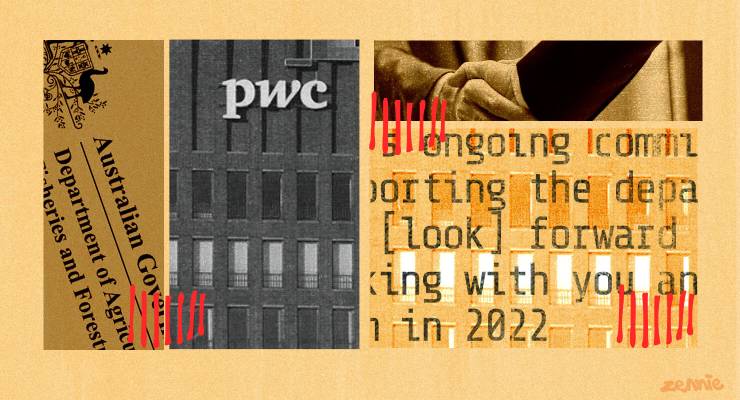
After PwC used confidential government information to solicit more work from a department, the government sent the consulting firm a “friendly” letter reminding it not to do it again and thanking the firm for its efforts.
The consulting firm, which had been engaged as a “strategic partner” of the Department of Agriculture, Water and the Environment as part of a $40 million contract, was warned in November 2021 over “high levels of direct sourcing and concerns around the strategic partner using confidential information to make unsolicited proposals”.
The warning came after “an instance where the strategic partner offered an Information Technology solution to [the department] as a result of insights gained by the strategic partner firm from attending [executive leadership team] meetings,” a recent auditor-general report said.
The news comes as the Australian Federal Police confirmed it’s investigating another confidentiality scandal involving PwC, also known as PricewaterhouseCoopers.
The January 2022 letter to PwC from Lionel Riley, a senior bureaucrat at the Agriculture Department, was revealed at budget estimates this week and obtained by Crikey.
“I would initially acknowledge PwC’s significant contribution to the department’s transformation agenda and its multi-faceted role of both supplementing and building the department’s internal capacity and capability, while at the same time delivering specialist expertise, critical advice and solutions,” the letter began.
Riley went on to say that while the department appreciated that it was necessary for PwC to get access to government operations, senior staff and information in order to do its job, PwC “must not use the knowledge and access … to develop commercial service offerings … or to otherwise provide unsolicited proposals to the department”.
The firm was also reminded not to share its knowledge of department operation “more broadly within its business”.
“In closing, I would like to acknowledge PwC’s ongoing commitment to supporting the department and [look] forward to working with you and your team in 2022 to assist us in achieving our transformation agenda,” the letter ended.
Department of Agriculture Secretary Andrew Metcalfe was grilled over the PwC contract at estimates on Wednesday.
He acknowledged that “$40 million is a very big sum of money” but insisted it had been spent wisely.
“In putting in place this arrangement, we were seeking to ensure the best possible value for money,” he said.
Metcalfe also said the department would have liked to hire more public servants instead of using consultants but that it had been unable to.
“Because we were being asked to do a lot more work and not being given any public servants to do that job, we were relying upon consultants and contractors,” he said.
Metcalfe described the meeting, involving PwC staff, that gave rise to the unsolicited proposal as a “workshop or a brainstorming session” rather than a “confidential discussion”.
“Following that, it’s clear that some form of conversation occurred between one of those PwC people at that meeting, and another part of PwC … and hence, we got this unsolicited approach,” Metcalfe said.
A PwC spokesperson told Crikey: “When the matter was raised by the client we addressed the feedback immediately and the engagement continued.”
Greens Senator Barbara Pocock, who grilled Metcalfe and obtained the letter from the department to PwC, described it as “a very friendly letter for what is clearly a serious breach of trust”.
“The tone is obviously inappropriate for such a serious matter,” she told Crikey.
In a separate development, Treasury Secretary Steven Kennedy said on Wednesday he had asked the AFP to consider a criminal investigation into PwC’s former head of international tax, Peter-John Collins, who shared confidential information about tax laws with colleagues and clients.
Collins had been asked by the federal government to help draft new laws to target multinational corporations accused of moving profits offshore.
“An investigation has commenced and no further comment will be made at this time,” an AFP spokesperson told Crikey.
The matter was investigated by the Tax Practitioners Board, which found Collins hadn’t acted with “integrity” and disqualified him from practising until the end of next year.








The poor go to prison. The wealthy and powerful are gently chastised.
Or promoted.
In Australia, surely it’s just business as usual for business, political, government and media elite cohort(s) that all look, sound and act the same (vs. general population)?
Not sure where or how democracy, transparency and ethical governance are supposed to fit in, when many of the same elites are busy dog whistling and gaslighting Australians to deflect our attention like US & UK?
And the Partners Without Conscience are put out to pasture on $140k a year.
Get the staffing caps off departments. Go back to employing staff who work for us rather than shareholders and only use consultants for short term jobs with clear conditions.
Succinct, precise, to the point. Well said David.
I am outraged by the kid gloves treatment PWC is getting for taking us all as mugs.
The Government should cancel all contracts with any of the big four accounting firms (PWC, KPMG, Deloitte, and EY) until they are investigated by the NACC. Inside the big four they have a saying that unless the client squeals, they haven’t charged enough. Its time to go after them hard.
How can the government extract itself from the ongoing PwC contracts which are locked in? Surely when one party has demonstrated they are unprofessional & conflicted this should negate any prior agreement.
I think that Pwc has voided any contract we have with them with this behaviour.
Logic would suggest this. But the government seems unsure it can break any PwC contracts as there may be ‘legal repercussions.’
It depends if the contract made provision for unprofessional conduct to terminate the agreement. Most sporting contracts have a standard clause that entitles the governing body to terminate the relationship without penalty if a contracted player “brings the game into disrepute.”
In the case of PWC, the repercussions would depend on the terms of the contract.
Who drafted the contract?
Presumably a well paid consultant, since the public service doesn’t have the expertise the draft anything that would protect the public service from well paid consultants.
That would be my expectaion too. In negotiating these contracts the public service, for whatever reasons, is often hopelessly naive and trusting, with predictable consequences. Whether it is because they are in fact hopelessly naive and trusting, or whether it is more a result of their ministers preferring them to yield to the consultants without any fuss, we can only guess.
An AFP spokes-bot told Crikey
And it’s just been revealed that PwC has the contract for auditing the AFP!
Let’s hope they can quietly come to some arrangement to avoid any embarrassment, eh? Just like when the AFP can be relied on to find nothing when it investigates a government minister.